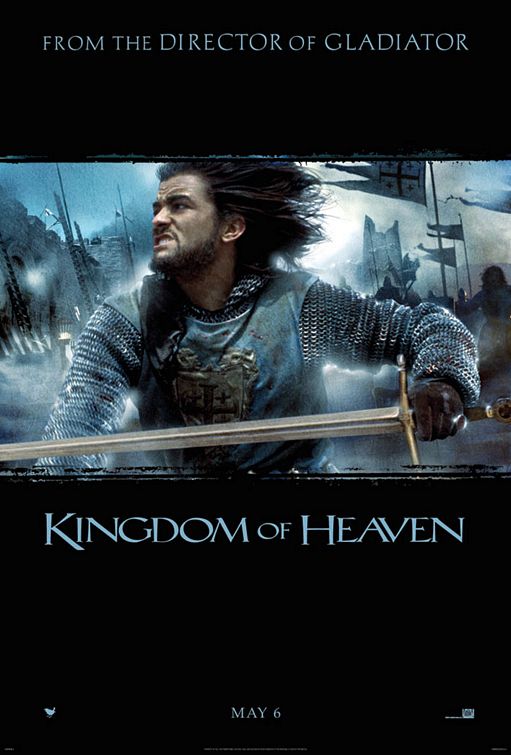“Anti-Christian Revisionist History”

| None | Light | Moderate | Heavy | |
|---|---|---|---|---|
| Language | ||||
| Violence | ||||
| Sex | ||||
| Nudity |
What You Need To Know:
KINGDOM OF HEAVEN, starring Orlando Bloom, is an intentional revisionist historical epic about the Crusades. A French blacksmith named Balian reunites with his lost father, Sir Godfrey, who beckons Balian to Jerusalem to serve the peaceful Christian King, Baldwin IV. Godfrey becomes mortally wounded during a skirmish in France, but he confers knighthood on Balian before he dies. In Jerusalem, Balian finds the kingdom and nobles there are torn apart by warmongers in their midst who want to end King Baldwin’s truce with the powerful Saladin. Balian also has an adulterous relationship with the King’s married sister. Eventually, Balian is forced to defend the people of Jerusalem against Saladin’s approaching army.
Set in the 1180s, KINGDOM OF HEAVEN is filmed on an epic scale, but has location shots that make Jerusalem look like Morocco. The acting, direction, set designs, and photography are superb, though the bigoted script is weak. The movie has an intentional anti-Christian worldview that attributes Muslim believes to Christians and Christian beliefs to Musims. It also contains a negative attitude against organized religion, revisionist history about the Christian kingdom in Jerusalem in 1187 and very strong action violence, with blood spurting.
Content:
(ABABAB, FRFRFR, RHRHRH, C, L, VVV, S, N, A, M) Very strong anti-Christian worldview that presents a very strong rivisionist history where Christians are portrayed as Muslims in their theology and Muslims are portrayed as Christians thus extolling athe false religious views of Islam, further marred by a strong negative attitude against organized religion, including some anti-Christian and anti-Muslim content, and works righteous theology depicted as kind of a modern re-interpretation of knighthood and chivalry, with strong revisionist history concerning two of the leading male Christian leaders associated with the Latin Kingdom of Jerusalem, concerning one of the men’s wife and concerning Christian church leaders, including the patriarch of Jerusalem who is shown in a negative light that is historically false (apparently, it was the Jerusalem patriarch instead of the protagonist, Balian of Ibelin, who urged that the city sue for peace with Saladin, the Muslim conqueror of Jerusalem, but it was indeed Balian who successfully concluded the negotiations without further bloodshed); a couple crude references to fathering illegitimate children; very strong action violence involving sword fighting, cavalry charges and Saladin’s final successful siege of Christian Jerusalem in 1187, including blood spurting, at least three men stabbed in neck with blood shown, boiling oil poured on soldiers, fiery catapult ammunition sets buildings and people on fire, protagonist burns and kills priest who desecrated his beloved wife’s grave, leprous man’s bloody hand and contorted face shown; implied adultery after couple shown embracing; upper male nudity; drinking wine; and, dissension among Christian Crusaders and movie argues in favor of Christians, Muslims and Jews to stop fighting over the holy sites in the Holy Land, but to share the land together, in peaceful coexistence.
More Detail:
It must be noted that many people make the politically correct mistake of thinking that Jerusalem is a holy site for Muslims, Jews and Christians. When Mohammed founded Islam in the seventh century, however, Jerusalem was only considered a holy city by Christians and Jews.
The movie opens with a French blacksmith named Balian mourning the death of his wife, who committed suicide after their baby died. Along comes a knight from the Crusades, Godfrey of Ibelin, who tells Balian that he is Balian’s father. At first, Balian refuses to come with Godfrey to Jerusalem, where Godfrey defends the Christian king there, Baldwin IV. When Balian kills a wicked priest who desecrates the grave of Balian’s wife, Balian follows Godfrey, but they are attacked by men from Balian’s village seeking justice.
Godfrey is mortally wounded, but, before he dies, he confers knighthood on Balian. “Be without fear in the face of your enemies,” Godfrey says. “Speak the truth, always, even if it leads to your death. Safeguard the helpless and do no wrong. That is your oath.”
In Jerusalem, Balian discovers that King Baldwin is dying of leprosy. He also discovers that the sister of King Baldwin, Sibylla, is the reluctant wife of the power hungry Baron Guy de Lisugnan. Guy is working secretly with the ruthless Reynald de Chatillon to start a war with the Muslims and their talented leader Saladin (aka Salah al-Din). The naïve king and his loyal supporters, however, believe in trying to live peacefully with both Jews and Muslims. Balian is told by one of the king’s supporters that the Kingdom of Heaven, and the kingdom of moral conscience, lies in one’s mind and one’s heart.
Despite their best efforts, things come to a head. Reynald begins attacking Muslim caravans, war breaks out, King Baldwin eventually dies, and it is up to Balian to defend the people of Jerusalem against Saladin’s overwhelming forces.
Set in the 1180s, KINGDOM OF HEAVEN is filmed on an epic scale, as befitting an historical epic about the Crusades. Regrettably, the locations do not look like Jerusalem since they have the city surround by sand dunes with snow capped mountains in the visible distance, completely ignoring the fact that the land around Jerusalem looks more like southern Italy. The acting, direction, set designs, and photography are superb, though the script is a little weak. For example, Balian seeks forgiveness in the Holy City of Jerusalem for his wife’s suicide and for slaying the priest, but this plot undercuts sympathy for his character and is left hanging after Balian arrives in Jerusalem. Also undercutting sympathy for Balian is an adulterous dalliance with the beautiful Princess Sibylla.
Like Wallace’s love affair with the French princess in BRAVEHEART, such a dalliance never took place historically, although Balian’s family did at one time want to arrange marriages between their family, Sibylla and her sister Isabella. Furthermore, Balian was never a blacksmith in France, nor was Sibylla’s husband as much a villain as this movie makes him out to be. In fact, according to the apparent historical record, Guy remained married to Sibylla until she died in 1190 and, if anything, the other noblemen around him didn’t like him because he was incompetent, not because he was evil.
Clearly, however, the nobles and rulers surrounding the Christian kingdom of Jerusalem were a bickering lot. They and their descendents, who tried to retake the area during and after Saladin’s reign, never did succeed in overcoming Islam’s cruel invasion of and subsequent tyrannical hold on the area, even though the majority of the inhabitants remained Christian up until the 20th Century.
Of course, depicting incompetence is not quite as exciting as depicting evil confronting goodness and chivalry. Thus, anti-Western KINGDOM OF HEAVEN shows that it was greedy, evil, war-mongering Europeans who instigated the final battles between the Kingdom of Jerusalem and Saladin’s forces. This may have been true of the aforementioned Reynald of Chatillon and some others, but the rest of the Christian populace, including the church leaders, were understandably fearful of Saladin and his armies. In fact, as the movie itself makes clear, Saladin previously had promised the Muslim clerics that his plan was to retake Jerusalem, when the time was right.
It is the religious leaders on both the Christian side and the Muslim side who don’t look so good in KINGDOM OF HEAVEN. Both are seen to be war-mongers, but the Christian religious leaders and followers come off looking worse than the followers of Islam. In fact, the Christians are portrayed as demanding that the Muslim inhabitants (a lie) pay a religious tax to live in the land, something that Islam requires, not Christianity.
There is, however, a sympathetic confessor knight who travels with Balian’s father and offers spiritual advice. His dialogue could easily have been rewritten to make it more explicitly Christian.
Overall, therefore, KINGDOM OF HEAVEN deserves an adhorrent for its intentional attack on Christianity, and its theological and historical weaknesses, not to mention its very strong action violence, which includes spurting blood. If the filmmakers had toned down the violence and added some positive, historically accurate references to God, the Bible and/or Jesus Christ, they could have made their movie more palatable to the broad audience of Americans who are Christian, and to the family audience.
The ending of KINGDOM OF HEAVEN argues in favor of religious tolerance and indirectly urges Christians, Jews and Muslims to work for the peace of Jerusalem. This, of course, probably is not possible considering the violent teachings of parts of the Koran, which inspires many Muslims. In the New Testament, Jesus and His apostles argue in favor of fighting evil with love and God’s grace, through the Gospel of Jesus Christ. Also, as Paul says in Acts 17:24, God does not dwell in temples made with human hands, even in temples built in Jerusalem. Viewed in this light, the religious fights over the holy sites in Jerusalem seem rather ridiculous. Historically speaking, however, the Jews abandoned Jerusalem and the temple there when they fled the Romans, and the Christians peacefully occupied and ruled the city until the Muslims came along and took it by rapacious and cruel force. The First Crusade was an attempt to rescue the overwhelming Christian majority in the Holy Land. We would do well if we remembered these facts when we debate the Crusades and the political future of Jerusalem.


 - Content:
- Content: 

